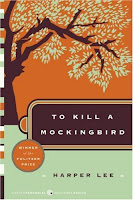Review: To Kill A Mockingbird by Harper Lee

To Kill A Mockingbird by Harper Lee (1960)
Winner of the 1961 Pulitzer Prize for Literature
Fiction, 323 pages
Harper Collins Publishers (2006)
Read as part of the Pulitzer Project.
Initially, I was introduced to Harper Lee’s novel through the 1962 movie starring Gregory Peck. However, I had never read the book. As I wanted this reading to be as fresh as possible, I made it a point not to read anything about the book: reviews, criticisms – nothing. I wanted any impressions made, to be my own. Not until finishing did I consult other reviews and study guides.
The amount of information available was absolutely overwhelming. But it was all someone else’s opinions, and this review is supposed to be about my own. Once I had divested myself of any preconceived notions and others pronouncements, I finally had a clearer idea of what my impressions really are about the novel.
Miss Lee has created a story that not only projects a strong theme of ethics and morals, but also contains subtle undercurrents of courage and prejudice (of class as well as race), which she has woven brilliantly throughout the narrative. There is also the loss of childhood innocence, which is a bittersweet moment. But it must come, and Miss Lee handles it eloquently and with respect. Yes, the lesson is instilled through tragedy, but with dignity, and this is what struck me so profoundly about the novel.
To Kill A Mockingbird is separated into two parts, yet they work together to illustrate the consequences of ignorance and prejudice. Strengthening the theme along the way is the character of Atticus Finch. He is the embodiment of moral rectitude; remaining constant and true, a physical reminder to his children and community that “right action and the greater good” are what makes up a person’s dignity – not their social standing, skin color, or economic status.
His children Jem and Scout, as well as their friend Dill, are exposed to situations which test their own understanding of right and wrong, good and evil. Part of this learning experience is seeing how people of strong moral character (Atticus) and those with little or none (Bob Ewell) react to circumstances into which they are thrust unwillingly. Both men are faced with a choice: do the right thing knowing full well that it will possibly mean losing the respect of friends, family, and community, or take the easier path of denying your own morality at the cost of dignity. As Atticus states, “…before I can live with other folks I’ve got to live with myself. The one thing that doesn’t abide by majority rule is a person’s conscience.”
In addition to this lesson about dignity, another is of courage. Sometimes the right choice is the hardest, and doesn’t always lead to victory. Courage is being able to face the inevitable, even if you know from the beginning, it is a lost cause. Here is where Miss Lee’s brilliance shines. It isn’t enough to have Atticus as a role model; she has each child learn this harsh truth through personal experiences. In one of the more poignant passages in the book, Atticus explains to Jem what real courage is, “I wanted you to see what real courage is, instead of getting the idea that courage is a man with a gun in his hand. It’s when you know you’re licked before you begin but you begin anyway and you see it through no matter what.”
One thing that surprised me the most about this book was the amount of controversy surrounding it, even to this day. But the reader must remember that the setting and tone of the novel accurately depicts others beliefs and behaviors in 1935 Alabama. How are we to understand this unless one gets into the mindset of its people and the harshness of its environment?
It was not a politically correct period in American History; therefore politically correct sensibilities must be set aside when reading this book.
In this novel, as in life, the goodness of men is always tempered with its opposite. The simple fact is that human nature is made up of the capacity to be ultimately kind or horrifyingly evil. But when the evil in us is faced with dignity, grace, and courage, it can be overcome.
I give this book 5 stars with the simple advisement that one take into consideration the language and subject matter and rise above it, for its message is much more important than the words used to convey it.


